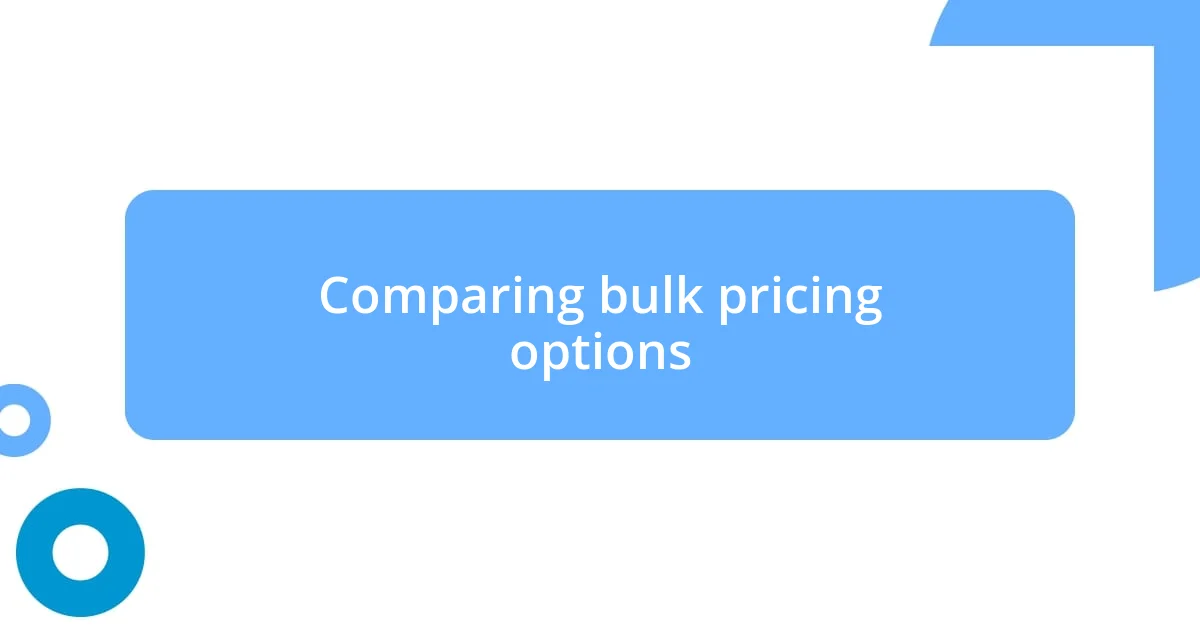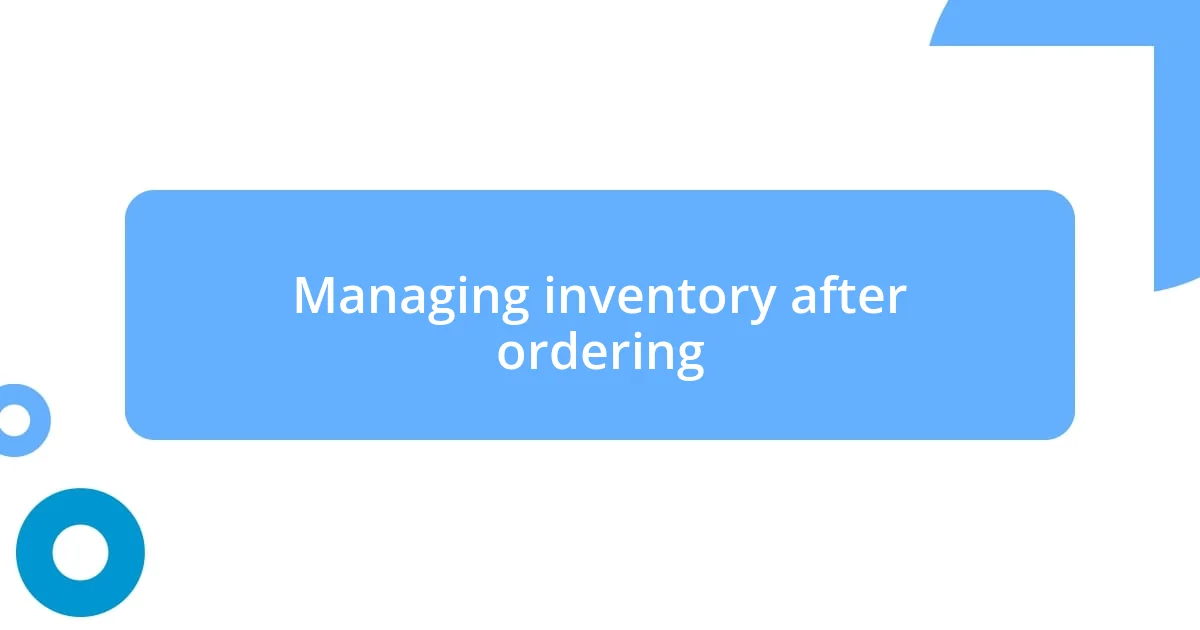Key takeaways:
- Bulk ordering offers significant cost savings, simplifies the purchasing process, and reduces environmental impact by minimizing packaging waste.
- Selecting reliable suppliers involves evaluating product quality, customer service, reputation, and their capacity to meet long-term needs.
- Effective inventory management and communication with your team are crucial after placing bulk orders to maintain awareness of stock levels and promote smarter purchasing decisions.

Understanding bulk ordering benefits
One of the most compelling benefits of bulk ordering is the cost savings. I still remember when I first discovered this while stocking up on office supplies for a team project. Instead of paying a premium for individual items, I bought in bulk and ended up saving a substantial amount, which I redirected toward more meaningful team activities.
Beyond just saving money, bulk ordering can simplify your purchasing process. Think about it—how much time do you spend reordering products each month? When I started purchasing in larger quantities, I found that I could focus on more important tasks instead of constantly managing supply levels. The peace of mind that comes with not worrying about running out of essentials is priceless.
Another aspect to consider is environmental impact. Bulk ordering often reduces packaging waste, which has made me more conscious of my purchasing habits. Have you ever thought about how those small decisions can contribute to a larger goal of sustainability? It’s empowering to know that each bulk order I make not only saves me money and time but also positively affects the planet.

Selecting the right suppliers
When it comes to selecting the right suppliers, doing your homework is vital. I vividly remember the first time I partnered with a supplier who seemed perfect—low prices and quick delivery. However, it wasn’t long before I discovered their quality control issues. Make sure to check reviews and testimonials, as they often reveal essential truths about reliability and performance.
Additionally, it’s crucial to evaluate their customer service. In one of my previous experiences, I had an urgent need for a product replacement, and the supplier’s unresponsiveness cost me valuable time and money. I’ve learned that good communication can make or break the purchasing experience, affecting everything from order clarity to shipment tracking.
Lastly, consider the supplier’s capacity to meet your long-term needs. A supplier might handle short-term orders well, but if you’re looking for a consistent relationship, reliability is key. I always ask potential suppliers about their scalability to ensure they can grow alongside my business.
| Supplier Criteria | Importance |
|---|---|
| Quality of products | Ensures reliability and satisfaction |
| Customer service | Critical for smooth transactions |
| Reputation | Reflects past performance and consistency |
| Capacity for growth | Important for long-term relationships |

Determining order quantities effectively
Determining the right order quantities can feel like a juggling act, but it’s crucial for maximizing your bulk buying benefits. I remember a time when I underestimated the quantity needed for an office event, leading to last-minute scrambling. It taught me to analyze usage patterns and forecast needs accurately. To effectively determine your order quantities, consider the following:
- Past Consumption Data: Look back at how much of a product you’ve used over specific periods. This insight helps project future needs.
- Storage Space: Assess how much space you have for storing bulk items. Overcrowding can lead to waste and damage.
- Lead Time: Factor in how long it takes for reorders to arrive. I’ve found that a slight overestimate can prevent stress and interruptions during busy seasons.
A close examination of these elements not only prepares you for fluctuations in demand but also elevates your overall purchasing strategy. By becoming attuned to your specific requirements, I’ve noticed a more streamlined process and a significant reduction in waste—and isn’t that something we all strive for?

Comparing bulk pricing options
When comparing bulk pricing options, you’ll often find that not all deals are created equal. I recall a situation where I thought I struck gold with an unbelievable price—only to discover that the hidden shipping fees blew my budget. It’s a reminder to read the fine print and evaluate the total cost, not just the sticker price. Have you ever felt that rush of excitement only to be hit with additional costs later?
Additionally, I’ve learned the importance of unit price comparisons across different suppliers. It’s easy to get overwhelmed by bulk deals, but focusing on the cost per unit simplifies decisions. After all, a seemingly cheaper bulk option might actually yield less product than a slightly pricier one. I’ve developed a habit of putting all my options side by side in a spreadsheet — it takes a bit of time, but the clarity it provides is invaluable.
Lastly, consider the terms of the bulk pricing. Are there minimum quantities required? Gosh, I’ve been caught before by assuming I could mix and match items, only to find out that wasn’t allowed. Flexibility in order customization can significantly influence the value of a bulk deal. The more you dig into the specifics, the more equipped you’ll be to make a savvy, informed choice!

Managing inventory after ordering
Managing inventory after you’ve placed a bulk order is just as crucial as determining those quantities in the first place. I remember my excitement when a huge shipment arrived, only to find myself scrambling to sort through boxes and track what I actually had. It’s vital to implement an inventory management system that works for you—whether it’s a digital tool or a simple spreadsheet. Have you ever faced a “where did that go?” moment? Keeping organized records can help avoid that headache.
Regularly reviewing your inventory is a habit I’ve found invaluable. Some months, I would look at certain items and think, “Wow, I didn’t realize I had so much of this!” I recommend setting reminders to conduct inventory checks. This helps identify slow-moving items and prevent them from collecting dust. Just the other day, I discovered a case of supplies I forgot I had. Why not make it a routine? It’s all about staying in touch with what you have and making people aware of stock levels.
Don’t underestimate the power of communication with your team, too. In my experience, sharing insights about inventory levels has led to smarter purchasing and a tighter grasp on what’s necessary. I often ask, “What do you think we should focus on next?” Engaging your team not only keeps everyone in the loop but also encourages smarter stock management across the board. It turns inventory from a burden into a collaborative process, something I’ve personally found rewarding.

Tips for negotiating bulk deals
When you’re in the thick of negotiating bulk deals, don’t shy away from showcasing your willingness to walk away. There was a time when I felt pressured to say yes, but remembering that there’s always another supplier made a world of difference. I often ask myself, “What’s the worst that could happen?” Surprisingly, it usually leads to a better offer. Emphasizing your alternatives often makes suppliers reconsider and sweeten the deal.
Building a rapport with the supplier can also be a game changer. Early on in my dealings, I realized that casual conversations often led to competitive discounts. I’d share a bit about my business and personal experiences, making the interaction feel less transactional. Have you ever noticed how a personal connection can lead to unexpected perks? The more they see you as a valued customer, the more likely they are to negotiate favorably.
Another effective tactic is to discuss long-term commitments. My experience has shown that suppliers love the idea of steady business. I once negotiated a price reduction by promising to order regularly over the next few months. When you position yourself as a reliable buyer, offers can become more attractive. After all, aren’t we all looking for that winning combination of loyalty and savings?












